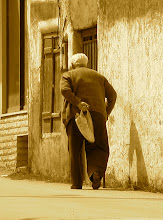
(iranbureau.com/webcult.gr)
A soon-to-be colleague has occasionally written, in advance of his arrival, to his soon-to-be colleagues asking for suggestions about what he might read in order to get 'up to speed' on his new soon-to-be country of domicile. Some have written suggesting that he read that hoary old staple 'Pity The Nation' (no more comments - see the other entries), or 'Understanding Arabs' or 'Killing Mr. Lebanon' and other constituents of the whole plethora of weighty, authorial tomes published about this country/region. Fair enough: forewarned is forearmed one might think, though it isn't - it simply means one arrives already armed with a series of 'official histories' and a ready-made collection of opinions that can then be thrashed out with others who have their own ready-made opinions, and so begins the agonising (in both senses of the word) discussions about historical opinion, bias, partiality and so on and so forth (most of my closest colleagues are Historians, so they love nothing more than this sort of professional self-flagellation anyway).
My own suggestion was that he eschew all of the other suggestions and begin to mine the waters of social media.
Now, of course, citizen journalism, blogging, twittering, facebooking and so on have their drawbacks: instantaneity does not necessarily indicate worthiness, immediacy does not necessarily engender quality. All of these points are well-known, both to observers as well as to participants. They are, however, a given, and, to a degree, such criticisms miss the point.
As an example, I first became aware of Twitter during the 'anhsyxia' that began in Athens, and soon spread to other European (and some non-European) cities just before Christmas 2008. Then, it was being used to publish photographs of what was happening, update participants on the movements of the various riot-police and snatch squads, and to coordinate movements and assemblies.
At times Facebook members ask each other if they would like to join this or that pressure group (I have less time for this - it strikes me as an antidote to civic participation and action rather than an encouragement to it) and, of course, recently (meaning, a couple of days ago), the leader of the 'defeated' Iranian opposition was making his most public announcements via his Facebook page, and was quoted as doing so by the august BBC ("In a statement made to social-networking site Facebook...").
Pinning down the precise nature of the uses and effects of one social media format or another is difficult and, arguably, a bit like counting angels on the head of a pin. Medium X may well be the choice du jour; tomorrow medium Y will usurp it. NowPublic may well be the current choice for citizen journalists, who knows what it will be tomorrow. And who cares?
Marshall McLuhan, of course, famously and presciently wrote that "the medium is the message." Social media forms exemplify this perfectly: it is not, really, the content of social networking sites and forms that is important, rather the message is about how people want to communicate, and what form of communication people find valuable and, increasingly, necessary. It is an antidote (to suppression, oppression, disenfranchisement, anomie...) and a cure.
All other considerations may well be interesting but they are all, in the worst sense of the word, academic.


No comments:
Post a Comment